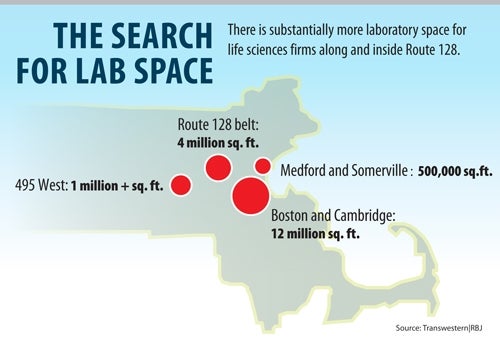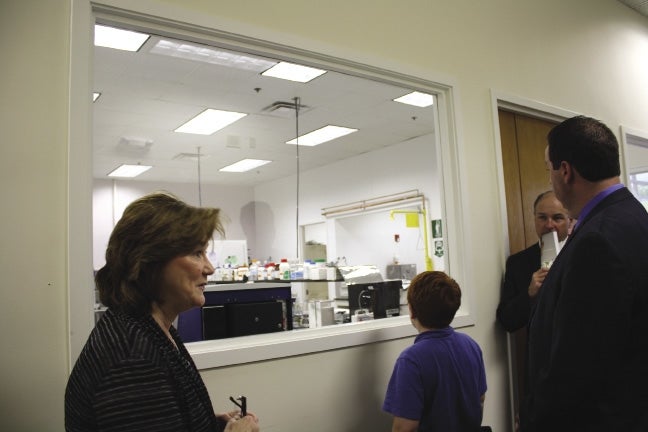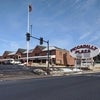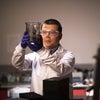With life sciences booming, is there room to grow here?
Karyopharm Therapeutics, a life sciences startup that's poised for growth following a successful IPO of stock and preliminary drug approvals, was a rising star in Natick until the company announced last month it was moving to a bigger headquarters in Newton at the end of July.
The news was, no doubt, disappointing to local economic development leaders, and it probably stung even more to learn that Karyopharm wanted to stay. According to Senior Vice President Paul Brannelly, the expanding company needed a larger headquarters, including laboratory space, but an initial search within Natick was unsuccessful.
Craig Johnston, senior vice president at commercial real estate firm R.W. Holmes Real Estate Co. in Wayland, showed Karyopharm executives some properties when they began their search several months ago, but there wasn't adequate lab space on the market.
That's typical of the MetroWest area, particularly Natick and Framingham, according to Johnston. He said startups that need small laboratories can find a home in the region, but an expanding company like Karyopharm may struggle.
“If you were looking for 30 to 50,000 square feet of lab space, you wouldn't find it in Natick and Framingham. You would have to build it out,” Johnston said.
That's an expensive prospect, and one many companies would rather skip, according to Johnston. In the end, Karyopharm found a 30,000 square-foot office with existing laboratory space in a Newton office park.
Patrick Reffett, Natick's director of community development, said it's frustrating, if not surprising, that life sciences companies may struggle to find space in MetroWest as they exit start-up mode. That's because communities around Boston are “head and shoulders above” many of those to the west when it comes to available laboratory space. And he's right. According to Boston-based commercial real estate firm Transwestern|RBJ, there is more than 12 million square feet of lab space in Boston and Cambridge alone.
The Route 128 belt has nearly 4 million square feet, while Medford and Somerville have nearly 500,000 square feet combined. The 495-West market, which includes Natick and Framingham and the Greater MetroWest region, has just over 1 million square feet of laboratory space, with about 12 percent of it vacant.
Tough sell to go west?
Despite the figures, Reffett said it's the job of economic development officials to persuade landlords to invest in their office buildings, and retrofit them to accommodate potential life sciences tenants. But Reffett admits it's a hard sell.
“You have to take the long view and recognize that … a lot of landlords (are) not going to prefer a potential use, if that use requires a significant investment in the property,” Reffett said.
Still, Reffett is convinced that building on spec for the life sciences industry — meaning before a tenant has agreed to lease — is a worthwhile investment. Eventually, successful life sciences tenants may generate higher rents for landlords, Reffett said, which increases property values and property tax revenue for the town.
Natick has adopted two economic opportunity areas at the East Natick Industrial Park and on Mercer and Strathmore roads off Route 9 (where Karyopharm is now located), which would offer a variety of local and state incentives to landlords who invest in their properties to attract tenants.
“I have been very eager to see it be effective,” Reffett said, noting that he's held meetings with property owners to highlight available opportunities, while the town has run advertising campaigns for the same purpose.
Landlord predicts expansion
Low laboratory space isn't just a Natick problem. Life sciences companies in search of homes may encounter the same predicament farther west, along the Interstate 495 belt, too, according to Harold Nahigian, a board member at MetroWest's new technology incubator, TechSandBox in Hopkinton. A property owner, Nahigian said existing laboratory space tends to be quite small in the vicinity of I-495. It's appropriate for newly launched life sciences firms, but not necessarily larger companies.
Nahigian said lab space is readily available inside the Route 128 belt. But he estimates that occupancy costs along the I-495 belt are about half of those found in Greater Boston, and predicted life sciences companies will look westward in the future.
“Over time I would expect there will be expansion,” Nahigian said.
And it's not as if there are no opportunities for growing life sciences companies. When it needed room to grow, RXi Pharmaceuticals, formerly of Westborough, was able to find a new space in neighboring Marlborough.
In the Marlborough Technology Center on Simarano Drive, RXi's new headquarters include ample laboratory space, and with about 2,000 square feet for future expansion.
“For smaller companies like ourselves, it was very difficult to find space that was already built out,” company spokeswoman Tamara McGrillen said.
The lab did require equipment and building code upgrades. But RXi executives did not want to disrupt employees who live in the region.











0 Comments